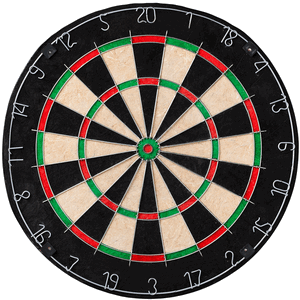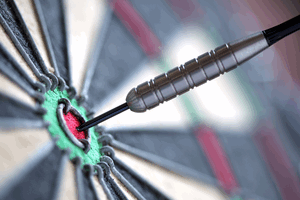Grand Slam Of Darts 2024 Betting Offers
 Those that know the world of darts know that it is essentially split into two, with the Professional Darts Corporation having been in existence since 1992 and the British Darts Organisation, which was created in 1973. The split came about because of a desire to earn more money, with the Embassy World Championship of 1993 being the last darts championship that was played in a unified sport.
Those that know the world of darts know that it is essentially split into two, with the Professional Darts Corporation having been in existence since 1992 and the British Darts Organisation, which was created in 1973. The split came about because of a desire to earn more money, with the Embassy World Championship of 1993 being the last darts championship that was played in a unified sport.
All of that might not seem particularly, relevant, but what gives it relevance is the fact that the Grand Slam Of Darts is technically a PDC event, but the best players from the BDO were invited to take part in it without risking their BDO membership. That was until the BDO went into liquidation in 2020 and since then the World Darts Federation (WDF as it is now called since the BDO collapsed in 2020) has not been invited to take part, making this a PDC only event.
It was established in 2007 and, until 2020, was the only competition held in the United Kingdom in which members of both organisations were are able to take part.
Here we’ve listed the best value betting deals for the Grand Slam, below this you can find information about the format, schedule and more.
Grand Slam Of Darts Betting Offers for 2024
This event has not started yet, please check back nearer the time. For other offers see our main loyalty page.
Grand Slam Of Darts Schedule & Format
| Date | Stage | Legs (Best Of) | Matches |
|---|---|---|---|
| 9th-12th November | Group Stage | 9 | 48 |
| 13th-14th November | Second Round | 19 | 8 |
| 15th-16th November | Quarter-Finals | 31 | 4 |
| 17th November | Semi-Finals | 31 | 2 |
| 17th November | Final | 31 | 1 |
The Grand Slam Of Darts has an initial group stage followed by a knockout competition.
Qualifying
 There are 32 players that are invited to take part in the competition, with 16 of them being made up of the winners or runners-up of PDC qualifying tournaments. Here’s a look at those tournaments, each of which supplies a place for the winner and the player that finished as runner-up:
There are 32 players that are invited to take part in the competition, with 16 of them being made up of the winners or runners-up of PDC qualifying tournaments. Here’s a look at those tournaments, each of which supplies a place for the winner and the player that finished as runner-up:
- PDC World Darts Championship
- Previous Year’s Grand Slam Of Darts
- World Matchplay
- World Grand Prix
- Masters
- UK Open
- European Championship
- Players Championship Finals
- Champions League Of Darts
- World Series Of Darts Finals
- PDC World Cup of Darts
- Premier League Darts
PDC World Cup Of Darts
 If the winner or runner-up of the event has already qualified via a different tournament then the place from that event is moved on to a different tournament.
If the winner or runner-up of the event has already qualified via a different tournament then the place from that event is moved on to a different tournament.
If fewer than 16 places are filled by those tournaments then the following tournaments from the PDC European Tour also have places attached for the winners:
- European Darts Open
- German Darts Championship
- German Darts Grand Prix
- German Darts Open
- Austrian Darts Open
- European Darts Grand Prix
- Dutch Darts Masters
- Danish Darts Open
- Czech Darts Open
- Austrian Darts Championship
- European Darts Matchplay
- International Darts Open
- Gibraltar Darts Trophy
If the 16 places in the Grand Slam Of Darts still haven’t been filled up at the end of those tournaments then the winners of the Players Championships are added according to those with multiple event wins to their name. After that the Order Of Merit is used to fill any remaining places.
The PDC also offers a specific qualifying event for this tournament, which takes place in the month or so before the tournament and has 8 places attached to it.
Prior to the collapse of the BDO, the British Darts Organisation would have places available to the men’s and women’s winner of the BDO World Championship as well as to the BDO World Trophy winner. The top ranked male and female players were also invited, as were the next highest ranked men’s players to fill up the remaining places. Whether that arrangement will be resumed in the future with the WDF is unknown.
How The Pools Work

Once the players that have qualified for the tournament have been decided they are split up into different pools. The pools are broken down as follows:
- Pool A – PDC Seeded Players
- Pools B, C & D – PDC Qualifiers
Once the pools have been decided one player is taken from each pool and put into a group.
The Group Stage
 A player from each pool is taken and put into one of 8 groups of 4 players. That means that all 32 players are assigned to a group, with the top 2 in the groups making it through to the knockout stage.
A player from each pool is taken and put into one of 8 groups of 4 players. That means that all 32 players are assigned to a group, with the top 2 in the groups making it through to the knockout stage.
All group matches are played in a best of 9 leg format, with each player playing 3 games before the placings are decided.
The breakdown of the tables in terms of the positioning of the players comes down to the number of points won (2 points for a win), then the positive or negative record in relation to legs.
Knockout Stage
| Opponent 1 | Opponent 2 |
|---|---|
| Group A Winner | Group B Runner-Up |
| Group B Winner | Group A Runner-Up |
| Group C Winner | Group D Runner-Up |
| Group D Winner | Group C Runner-Up |
| Group E Winner | Group F Runner-Up |
| Group F Winner | Group E Runner-Up |
| Group G Winner | Group H Runner-Up |
| Group H Winner | Group G Runner-Up |
The knockout stage of the competition sees the 16 players that made it out of the groups go up against each other in best of 19 leg games. The second round head-to-heads are shown above.
The winners of the second round matches will then move on to play in the quarter-finals, which are best of 31 leg games. Those winners will then proceed into the semi-final, which is also best of 31 legs, with the semi-final winners progressing to the final. This is also played in a best of 31 leg format.
Prize Money
| Stage Reached | Prize Money |
|---|---|
| Fourth In Group | £5,000 |
| Third In Group | £8,000 |
| Group Winner Bonus | £3,500 |
| Last Sixteen | £12,250 |
| Quarter-Finals | £25,000 |
| Semi-Finals | £50,000 |
| Runner-Up | £70,000 |
| Winner | £150,000 |
| Total | £650,000 |
As with any competition that has taken place over a number of years, the Grand Slam Of Darts offers more to the winner now than it did when the competition started. In 2007, for example, the winner received just £80,000 with the runner-up getting £35,000, all from a total prize pool of £300,000.
The amount of money a player is awarded depends entirely on the stage at which they got knocked out. The table above looks at the prize money from the 2023 edition, to give you some idea of what has changed.
The player that wins the group also receives a bonus of £3,500. The total prize pool available was £650,000, which is a marked increase on the competition’s inaugural year. That is reflected in the fact that the runner-up in 2023 received double that of the runner-up 2007.
Nine dart finishes can also win any player £10k.
Television Coverage

The competition has long proven to be a popular one with television audiences. ITV had the coverage for the first four iterations of the Grand Slam Of Darts, with the inaugural year shown mostly on ITV1. The coverage shifted to ITV 4.
Viewing figures in 2009 ranged from 208,000 to a high of 454,000 for the final. In 2011 Sky took over the broadcast rights and the competition has remained on the pay-tv network ever since.
The History Of The Grand Slam Of Darts
 Obviously there’s a very real extent to which the competition’s youth in comparison to other darts tournaments means that its history is still to be written. The first iteration of the event took place in 2007 at the Wolverhampton Civic Hall, with the 32 best players from across both darts organisations being invited to take part. It involved the players being split into groups and was eventually won by Phil ‘The Power’ Taylor when he defeated Andy Hamilton in the final.
Obviously there’s a very real extent to which the competition’s youth in comparison to other darts tournaments means that its history is still to be written. The first iteration of the event took place in 2007 at the Wolverhampton Civic Hall, with the 32 best players from across both darts organisations being invited to take part. It involved the players being split into groups and was eventually won by Phil ‘The Power’ Taylor when he defeated Andy Hamilton in the final.
Quite how much of a representation of the two governing bodies of darts that first Grand Slam Of Darts was is a matter for some debate. Whilst Taylor is obviously one of the best players ever to play the game, it was two players that played in the group stage in the form of John Part and Mark Webster who would be crowned World Champions of the two organisations around two months after the competition took place. That being said, Taylor did go on to win the next two Grand Slam tournaments, so it’s fair to say he was a worthy winner.
In fact it took until 2010 for someone other than The Power to win the Grand Slam Of Darts, with Steve Beaton beating him in the quarter-finals that year. Scott Waites made the final against James Wade, defeating him 16-12 and becoming the only British Darts Organisation player to win the title to date. Taylor was back in winning ways in 2011, missed out in 2012 (beaten by Raymond van Barneveld) and won against in 2013 before retaining it the following year to cement his place as one of the greatest darts players of all time.
Michael van Gerwyn took over he domination from Phil, winning three times in succession between 2015-2017. This was followed by consecutive wins from Gerwyn Price in 2018 & 2019.
It took until 2020 for someone outside of the spotlight to win the event, with Portuguese Jose de Sousa taking the title. This competition was played behind closed doors due to coronavirus and that could be a reason why lesser players were able to flourish without the pressure from the crowd. Gerwyn Price resumed normal service a year later, though, winning his third title in 2021.
Michael Smith finally won in 2022 on his 9th appearance at the Grand Slam, beating Nathan Aspinall 16-5 in Smith’s first final. This is not as unlucky as James Wade who has 15 appearances and three finals without a win yet. Peter Wright has also lost three finals in ten appearances and Gary Anderson two finals in 15 appearances.
The following year saw another first time winner when Luke Humphries beat Rob Cross in the final. Cross had a fantastic tournament, at one point averaging more than when he beat Phil Taylor in the 2018 World Championship. He surely thought it was his year but the ‘finisher’ couldn’t this time and Humphries strolled home quite easily in the end winning 16-8.
In terms of the most noteworthy things to happen to the competition, it left the Wolverhampton Civic Hall for the first time since its inception when it was hosted by the Aldersley Leisure Village in 2018 and then again in 2019 and 2021. The Leisure Village is only about 3 miles away from the centre of Wolverhampton, so it was an obvious venue to turn to when renovations were being carried out on the Civic Hall.
Grand Slam Of Darts Records
| Player | Appearances | Finals | Won (%) |
|---|---|---|---|
| Phil Taylor | 11 | 7 | 6 (86%) |
| Michael van Gerwen | 15 | 4 | 3 (75%) |
| Gerwyn Price | 7 | 3 | 3 (100%) |
| Scott Waites | 6 | 2 | 1 (50%) |
| Raymond van Barneveld | 14 | 1 | 1 (100%) |
| Luke Humphries | 4 | 1 | 1 (100%) |
| Michael Smith | 9 | 1 | 1 (100%) |
| José de Sousa | 2 | 1 | 1 (100%) |
The table above shows players who have won the Grand Slam.
No player has played in more finals than Phil ‘The Power’ Taylor, who appeared in 7 prior to his retirement. Similarly he holds the record for number of wins to his name, being victorious in this competition 6 times and only losing once.
James Wade and Peter Wright have the distinction of being the ‘unluckiest’ players, having reached 3 finals each but winning none of them. Gary Anderson has played in two finals each and lost them both, Anderson and Wade, alongside Michael van Gerwen, have also appeared in the tournament more times than any other players, including Taylor, at 15 times.
James Wade, Kim Huybrechts, Dave Chisnall, Dimitri Van den Bergh, Josh Rock and Ryan Searle have all managed 9 dart finishes at some point or another during their time playing in the competition, with only Wade and Rock failing to win their matches as a result.
Perhaps somewhat unsurprisingly, it’s Michael van Gerwen with the highest match-winning one-match average, achieving 115.19 against Joe Cullen in the Group Stage of 2021. The highest tournament average was also Michael van Gerwen with 105.42 in 2015, he also has second place on that list when he averaged 105.12 in 2017.



